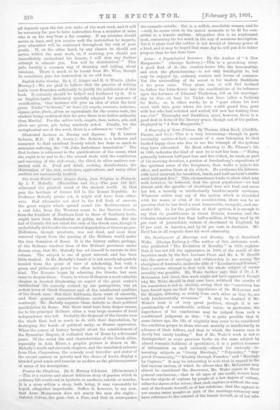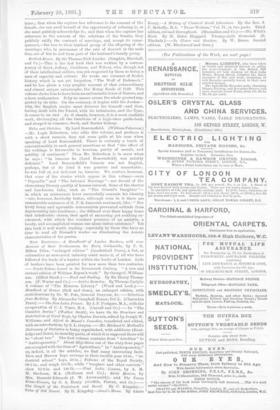The Development of Marriage and Kinship. By C. Staniland Wake.
(George Redwa,y.)—The author of this elaborate work, who published "The Evolution of Morality" in 1878, explains that it was not till the appearance, in 1880, of the result of the inquiries made by the Rev. Lorimer Eisen and Mr. A. W. Hewitt into the system of marriage and relationship in use among the aborigines of Australia, under the title of " Kamilaroi and 'Carnal," that a serious attempt to deal with the whole subject of sexual morality was possible. Mr. Wake further says that if Dr. J. F. McLennan had lived, this work might not have appeared, though why Mr. Wake should in that case have withheld the results of his researches is not so obvious, seeing that the "conviction has been forced upon me that the hypotheses of Dr. McLennan and Dr. Morgan, differing so widely from each other as they do, are both fundamentally erroneous." It may be doubted if Mr. Wake's book is of very great positive, though it is un- questionably of considerable critical value; in particular, the importance of his conclusions may be judged from such a conditioned judgment as this : "It is quite possible that in some future age, the life of virginity may come to be considered the condition proper to those who are morally or intellectually in advance of their fellows, and that to which the human race is slowly but surely tending," But if Mr. Wake's work is not so• distinguished as some previous books on the same subject by almost romantic boldness of speculation, it is a perfect treasure of information on such curiously—almost too curiously—in- teresting subjects as "Group Marriage," "Polyandry," "Sup- posed Promiscuity," "Kinship through Females," and "Marriage by Capture." It may be interesting to note that in regard to the last curious custom, of which he allows that Mr. McLennan may almost be considered the discoverer, Mr. Wake. comes to these general conclusions,—that in all ages of the world, women have been the objects of capture by people of a low degree of culture, either for slaves or for wives ; that such capture is without the con- sent of the female herself, or of her relations ; that the capture in use among many peoples as part of the marriage ceremony may have reference to the consent of the female herself, or of her rela-
tions ; that when the capture has reference to the consent of the female, she can avail herself of the opportunity of refusing it, or she must publicly acknowledge it ; and that when the capture has reference to the consent of the relations of the female, they publicly ratify the contract of marriage, and accept its conse- cuonces,—the loss to their kindred group of the offspring of the marriage, who, in pursuance of the rule of descent in the male line, are of kin to and form part of the husband's family group.







































 Previous page
Previous page